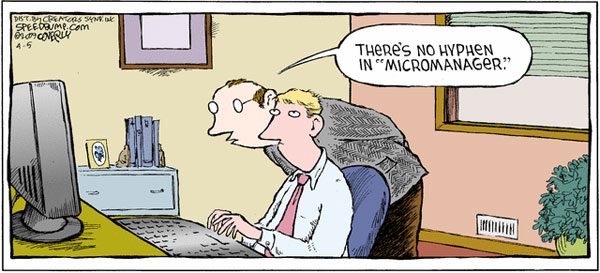I have a disorder of a kind known as “can not keep my mouth shut.” If I think someone isn’t being honest, or even if I just disagree with them strongly, my arm raises, and my mouth engages, well before my brain can calculate the possible damage.
I have been in successful recovery for years and I am here to share what I’ve learned.
As a rule, if you insist on always speaking your mind, you will inevitably find yourself in an environment where everyone hates you. Most people can not handle the truth (or what you believe is the truth). And the more you shove it in their face, the easier it is for them to ignore you. You simply become the person who always complains. Your ideas will be shot down simply because of the reputation of the mouth they come from.
The trick to keeping your mouth shut is this: put the desire to effect positive change above your instinct to tell people they’re wrong. The later almost never leads to the former.
Back in my early days at Microsoft I worked on strong teams where you were expected to have opinions. If you saw something stupid happening you were obligated to raise your hand, say “I think this is stupid and here’s why.” If you were right, you were applauded no matter how senior the people in the room were. I argued with group managers, VPs, and many other tough, smart people far more senior than I was. If I was wrong, I was dismissed, but not scolded. I might have heard praise for not being afraid. I thrived in this environment and assumed this was how the world worked.
But later, in a new job at Microsoft in a group known as MSTE, I discovered a different world. No one spoke their mind in public. Few people worked hard or asked tough questions. Quality of work, and morale, was low. I felt obligated to mention these facts as often and as loudly as possible to leadership. I even expected to be rewarded for telling people how bad things were. Why wouldn’t they want to hear this? I thought.
Before I knew it, I was that guy. The guy who always complains.
In my egocentric view, the work around me was well beneath the bar. But I didn’t stop to think the group had its own bar, it’s own culture and it was not my job to set it. And I was far from having enough respect from anyone to be seen as a leader, which would be required to change the culture anyway.
It took months of suffering to realize I was in a different culture with different expectations. It blew my mind to realize there were other cultures at all. To achieve the same positive effects my opinionated nature had early in my career, I’d have to adopt a very different approach.
I also realized in the past, in other groups, progress happened not simply because I was right and took a stand (as much as my ego wished it to be true). It happened because my boss, or his/her boss, listened to my points and took action, or granted me the power to do so. Having an idea changes nothing unless someone with sufficient power, and genuine interest, does something about it. The idea alone is never enough. Nor is saying it out loud.
In the movie Glengarry Glenn Ross, Blake (played by Alec Baldwin) gives perhaps the meanest lecture of all time to a bunch of salesmen. Why is this lecture possible? Why didn’t they ignore him or beat him up? Is it Alec’s strong chin and trim physique? No, it’s because the owners of the company asked him to do it. He’s allowed to open his mouth, and speak a certain kind of truth, however unnecessarily mean and adversarial it is, because he has the support of the people in power (You can watch this amazing scene here – NSFW). You could never successfully behave this way unless someone with more power then you allowed you to.

There’s another scene in Glengarry Glen Ross, where a salesman (played in the movie by Al Pacino) yells at the sale manager (played by Kevin Spacey), never to open your mouth until you know the shot. If you don’t know the angle being played, anything you say might ruin the plan (you can watch the scene here).
This is a great rule to follow before you raise objections or offer big ideas. No matter how right you are, if you care about effecting change, you should never open your mouth without some sense of who will agree with you and who won’t. If you can anticipate the angles and responses, and judge, even by guessing, if there is a 80%, 20% or 0% percent chance anyone in good standing will follow your lead in support of what you say, you know whether it’s worth opening your mouth. It’s a world of difference of perception when someone respected says, after you speak, “he might be right” and when there’s only silence. And of course, in most cases your percentages go up if you raise your objections in private, rather than in a large meeting where egos are at stake.
These days, as an independent, I’m invited to visit and speak to different groups every week, in different cities and countries around the world. I depend on my ability to evaluate the culture I’m in each and every time.
Of course there are times when the BS has piled up too high and you have to speak the truth no matter the consequences. Forcing an issue can be the only way to get it the attention it deserves. But pick your battles. If a year goes by and you haven’t taken a single stand, I’d likely call you a coward (Nothing in 12 months was worth making a stink over? You have to draw your sword now and then to remind people you have one). But if you’re taking a stand every day, you’re either a glutton for punishment, an egomaniac, or too stupid to realize you’re working for the wrong people.
How to say things well, including the tough stuff, is another matter entirely and one I’ll save for another post.
Meanwhile, to help with my own recovery: how do you decide when to open your mouth, and when to keep it shut? At work or at home?






 One old argument in the history of tech progress is the tragic loss of a side effect of an old technology, and that it will be lost forever with the new technology. But we can be sentimental about anything, even stupid things, things no one liked even when the technology was popular. Thanks to
One old argument in the history of tech progress is the tragic loss of a side effect of an old technology, and that it will be lost forever with the new technology. But we can be sentimental about anything, even stupid things, things no one liked even when the technology was popular. Thanks to